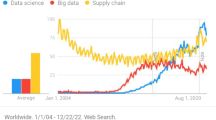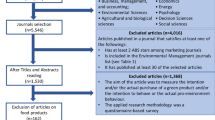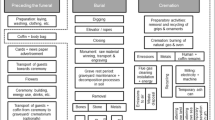Abstract
Purpose
Social life cycle assessment (SLCA) is an approach to assess social performances over the entire product’s life cycle. Type I SLCA consists in a qualitative analysis of product’s activities through a set of subcategory indicators. To facilitate decision-making, it is useful to aggregate the subcategory indicator performances of the different activities along the product system into stakeholder dimensions. Currently, these aggregation steps are based on value judgments as scoring and weighting factors. We identified two types of uncertainties related to these value choices: (i) the uncertainty related to the scoring choice and (ii) the uncertainty related to the weighting factors. However, no current SLCA research considers the uncertainty of these value choices. The main objective of this work is to propose a method to systematically address uncertain scoring and weighting factors in SLCA.
Methods
Our method is structured in three phases: (i) assessing the uncertainty of the scoring factors, (ii) assessing the uncertainty of the subcategory indicators aggregation into stakeholder dimensions, and (iii) interpreting stochastic SLCA results. Monte Carlo simulations were conducted in order to generate stochastic SLCA results from randomly chosen scoring and weighting factors from value judgments of SLCA experts. We applied the approach on an illustrative case study comparing different options of biodiesel supply.
Results and discussion
Stochastic social impact scores were obtained for three considered stakeholder dimensions by propagating the uncertainty of the scoring and the weighting factors. Interpretation of stochastic SLCA score was performed by analyzing the first rank probability of each supply option within each stakeholder dimension. Results show a stable first rank position (100%) of one among the four options in two stakeholders’ dimensions (workers and society). For the local community stakeholder dimension, three out of the four supply options were likely to take first rank with a likelihood of 91, 8 and 1%, respectively.
Conclusions
Addressing uncertainty in social life cycle assessment allows to explicitly include the unavoidable variability of value choices adopted to aggregate the social performance evaluation of each activity over the product life cycle and across subcategory indicators into few meaningful stakeholder dimensions indicators. We demonstrated that our stochastic approach is key to inform decision makers about the robustness of SLCA results and showed that the ranking of a deterministic approach can be potentially modified when uncertainty is included.






Similar content being viewed by others
Notes
Monte Carlo simulation consists in randomly select an uncertain parameter considering its probability density function in order to generate a sample of simulated results (Muller et al. 2014).
References
Bengtsson M (2001) Weighting in practice: implications for the use of life-cycle assessment in decision making. J Ind Ecol 4(4):47–60
Benoît C, Mazijn B (2009) Guidelines for social life cycle assessment of products. Life Cycle Initiative. http://www.unep.fr/shared/publications/pdf/DTIx1164xPA-guidelines_SLCA.pdf. Accessed 20 June 2015
Benoit-Norris C, Norris GA, Valdivia S, Ciroth A, Moberg A, Bos U, Praksha S, Ugaya C, Beck T (2010) The guidelines for social lifecycle assessment of products: just in time! Int J Life Cycle Assess 15:156–163
Carmo BBT, Margni M, Baptiste P (2017) Customized scoring and weighting approaches for quantifying and aggregating results in social life cycle impact assessment. Int J Life Cycle Assess. doi:10.1007/s11367-017-1280-4
Dong YH, Ng ST (2015) A social life cycle assessment model for building construction in Hong Kong. Int J Life Cycle Assess 20:1166–1180
Ekener-Petersen E, Finnveden G (2013) Potential hotspot identified by social LCA—part 1: a case study of a laptop computer. Int J Life Cycle Assess 18:127–143
Ekener-Petersen E, Moberg Å (2013) Potential hotspot idenfied by social LCA–Part 2: Reflections on a study of a complex product. Int J Life Cycle Assess 18:144–154
Finkbeiner M, Schau EM, Lehmann A, Traverso M (2010) Towards life cycle sustainability assessment. Sustainability 2:3309–3322
Hosseinijou SA, Mansour S, Shirazi MA (2014) Social life cycle assessment for material selection: a case study of building materials. Int J Life Cycle Assess 19:620–645
Hyde K, Maier HR, Colby C (2003) Incorporating uncertainty in Promethee MCDA method. J Multi-Criteria Decis Anal 12:245–259
Jørgensen A (2013) Social LCA—a way ahead? Int J Life Cycle Assess 18:296–299
Macombe C, Leskinen P, Feschet P, Antikainen R (2013) Social life cycle assessment of biodiesel production at three levels: a literature review and development needs. J Clean Prod 52:205–216
Macombe C, Loeillet D, Gillet C (2016) Extended community of peers and robustness of social LCA. Int J Life Cycle Assess. doi:10.1007/s11367-016-1226-2
Marinoni O (2005) A stochastic spatial decision support system based on PROMETHEE. Int J Geogr Inf Sci 19(1):51–68
Muller S, Lesage P, Ciroth A, Mutel C, Weidema BP, Samson S (2014) The application of the pedigree approach to the distributions foreseen in ecoinvent v3. Int J Life Cycle Assess 21:1327–1337
Revéret JP, Couture JM, Parent J (2015) Socioeconomic LCA of milk production in Canada. In: Muthu SS (ed) Social life cycle assessment. Springer, Singapore, pp 25–69
Russo Garrido S, Parent J, Beaulieu L, Revéret JP (2016) A literature review of type I SLCA—making the logic underlying methodological choices explicit. Int J Life Cycle Assess. doi:10.1007/s11367-016-1067-z
Sanchez-Ramirez PK, Petti L, Haberland NT, Ugaya CML (2014) Subcategory assessment method for social life cycle assessment. Part 1: methodological framework. Int J Life Cycle Assess 19:1515–1523
Sanchez-Ramirez PK, Petti L, Brones F, Ugaya CML (2016) Subcategory assessment method for social life cycle assessment. Part 2: application in cocoa soap. Int J Life Cycle Assess 21:106–117
Ugaya CML (2015) The social assessment of products. In: Murray J, Mcbain D, Wiedmann T (eds) The sustainability practitioner’s guide to social analysis and assessment. Commun Group, Chicago, pp 18–27
Vinyes E, Oliver-Solà J, Ugaya C, Rieradevall J, Gasol CM (2013) Application of LCSA to used cooking oil waste management. Int J Life Cycle Assess 18:445–455
Zamagni A, Amerighi O, Buttol P (2011) Strengths or bias in social LCA? Int J Life Cycle Assess 16:596–598
Acknowledgements
Financial support from Coordenação de Aperfeiçoamento de Pessoal de Nível Superior (Capes) is gratefully acknowledged (Capes scholarship / Doutorado Pleno / Processo no. 0415/13-8). The authors would also like to thank the International Reference Centre for the Life Cycle of Products, Processes and Services (CIRAIG).
Author information
Authors and Affiliations
Corresponding author
Additional information
Responsible editor: Catherine Macombe
Rights and permissions
About this article
Cite this article
do Carmo, B.B.T., Margni, M. & Baptiste, P. Addressing uncertain scoring and weighting factors in social life cycle assessment. Int J Life Cycle Assess 22, 1609–1617 (2017). https://doi.org/10.1007/s11367-017-1275-1
Received:
Accepted:
Published:
Issue Date:
DOI: https://doi.org/10.1007/s11367-017-1275-1




